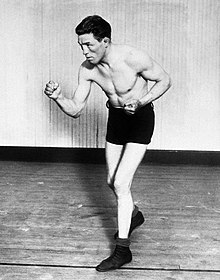Ted "Kid" Lewis
| Ted "Kid" Lewis | |
|---|---|
 |
|
| Statistics | |
| Real name | Gershon Mendeloff |
| Nickname(s) | The Aldgate Sphinx |
| Rated at |
Light Heavyweight Middleweight Welterweight |
| Height | 5 ft 7.5 in (1.71 m) |
| Reach | 69 in (175 cm) |
| Nationality | English |
| Born | Varies depending on source, either 28 October 1893 or 24 October 1894 Parish of St George in the East, London |
| Died | 20 October 1970 (aged 75) |
| Boxing record | |
| Total fights | 300 |
| Wins | 193 |
| Wins by KO | 80 |
| Losses | 32 |
| Draws | 14 |
| No contests | 0 |
Ted "Kid" Lewis (born Gershon Mendeloff; 28 October 1893 – 1970) was an English professional boxer who twice won the World Welterweight Championship (147 lb). Lewis is often grouped alongside the all-time greats, with ESPN ranking him 41st on their list of the 50 Greatest Boxers of All-Time and boxing historian Bert Sugar placing him 46th in his Top 100 Fighters catalogue. Statistical boxing website BoxRec ranks Lewis as the 17th best welterweight of all-time and the 7th best UK boxer ever. He is a member of the International Jewish Sports Hall of Fame, the Ring Magazine Hall of Fame, and the International Boxing Hall of Fame
Lewis was born in a gas-lit tenement in the Aldgate Pump section of London’s East End as Gershon Mendeloff. One of his brothers became a boxer under the name of Lou (Kid) Lewis. It was as a member of London’s Judean Athletic Club that Mendeloff assumed the name "Kid" Lewis ("Ted" was added later, in America). At 14 he fought for sixpence and a cup of tea. He later won the Club’s Flyweight title and took home a cup of imitation silver.
He became a professional boxer in 1909. On 6 October 1913, Lewis won the British Featherweight Championship with a 17th-round knockout of Alec Lambert at London’s National Sporting Club. A year later, on 2 February 1914, at London’s Premierland (in Whitechapel), he won the European Featherweight title from the French boxer Paul Til via a 12th round foul. Still in 1914, campaigning as a lightweight and welterweight, Lewis left London and toured Australia. In 1915 Lewis traveled to the United States, fighting Phil Bloom in New York’s Madison Square Garden. He won a decision.
...
Wikipedia
